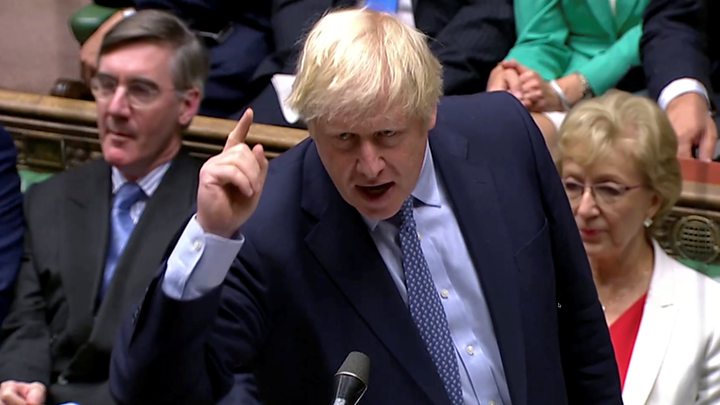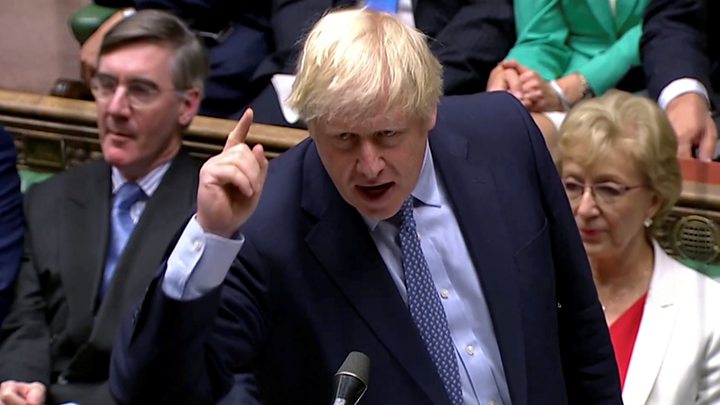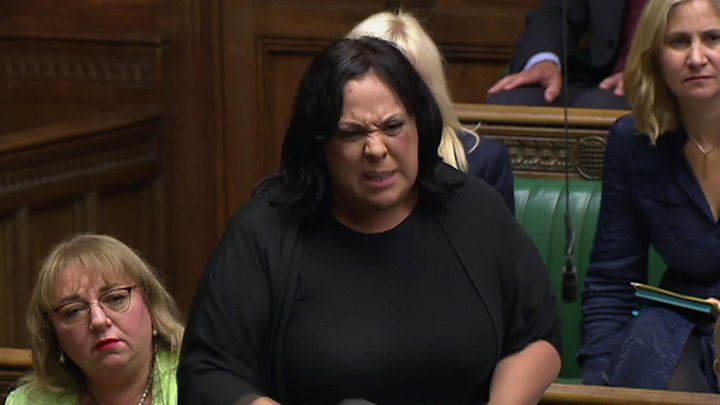Boris Johnson faces backlash over ‘dangerous’ language
The prime minister is criticised in a heated Commons debate after accusing MPs of “sabotaging” Brexit. …


Media playback is unsupported on your device
Boris Johnson is facing a backlash from MPs after he was accused of using “dangerous” language over Brexit.
In a heated Commons debate on Wednesday, the PM repeatedly accused MPs of “sabotaging” Brexit, accusing them of passing a “surrender act”.
The comments led one Labour MP to urge him to curb his “violent” remarks, arguing MPs had faced death threats from people using similar language.
In response, Mr Johnson described the intervention as “humbug”.
The highly charged debate – described by the BBC’s political editor Laura Kuenssberg as one of the most brutal she had ever witnessed – came a day after the Supreme Court ruled Mr Johnson’s suspension of Parliament unlawful.
The prime minister insisted to the Commons that the court had been “wrong to pronounce on a political question at a time of great national controversy”.
He also challenged the opposition parties to table a vote of no confidence or back a general election and face a “day of reckoning” with voters.

Media playback is unsupported on your device
During an ill-tempered debate, the prime minister was repeatedly challenged by opposition MPs over his use of the word “surrender” to describe legislation passed earlier this month which aims to block a no-deal Brexit on 31 October.
Pointing to a plaque in the chamber commemorating Labour MP Jo Cox, who was murdered by a right-wing extremist days before the EU referendum in 2016, Labour’s Paula Sherriff said: “We should not resort to using offensive, dangerous or inflammatory language for legislation that we do not like, and we stand here under the shield of our departed friend with many of us in this place subject to death threats and abuse every single day.
“They often quote his words ‘Surrender Act’, ‘betrayal’, ‘traitor’ and I for one am sick of it.
“We must moderate our language, and it has to come from the prime minister first.”
In response, Mr Johnson said: “I have to say, Mr Speaker, I’ve never heard such humbug in all my life.”
Tracy Brabin, who was elected as MP for Batley and Spen after Ms Cox’s murder, also urged the prime minister to moderate his language “so that we will all feel secure when we’re going about our jobs”.
Mr Johnson replied that the best way to honour the memory of Jo Cox – who campaigned for Remain – and bring the country together was “to get Brexit done”.
Mrs Cox’s husband, Brendan, later tweeted he felt “sick at Jo’s name being used in this way”.
‘Jaws dropped in disbelief’
“I’m not sure that we can look the nation in the eye and say that was a good day.”
That’s how a Conservative MP has described the torrid scenes in the Commons in the last 24 hours.
Outrage is a common currency these days, but MPs’ jaws dropped as Mr Johnson ramped up the rhetoric in responses to questions – suggesting first that it was “humbug” for a Labour MP to demand he temper his language, to try to protect MPs’ safety.
Then, he went on to say that the appropriate legacy for the MP who was murdered during the referendum, Jo Cox, was for MPs to complete the Brexit process.
No surprise that Labour MPs howled in protest, some left the Commons in disbelief.
And there may be few Tory MPs willing, as the day goes on, to defend how far he went.
Labour leader Jeremy Corbyn said the PM’s language “was indistinguishable from the far right”, while his Liberal Democrats counterpart Jo Swinson said Mr Johnson’s comments were “a disgrace”.
She also told MPs that earlier on Wednesday she reported a threat against her child to the police.
Former cabinet minister Amber Rudd – who quit the government and the Conservative Party over Mr Johnson’s approach to Brexit – told ITV’s Peston programme the prime minister’s comments were “dishonest and dangerous”.
And the Conservative former cabinet minister Stephen Crabb told BBC Newsnight that he was “shocked by the way [the PM] responded to the remarks about Jo Cox”.
Culture Secretary Nicky Morgan tweeted that Mr Johnson was “aware and sympathetic” to the threats MPs have received.
“But at a time of strong feelings we all need to remind ourselves of the effect of everything we say on those watching us,” she said.
‘No confidence vote’
Also in the debate, opposition parties again made clear they would not agree to an election until they were sure the threat of a no-deal Brexit on October 31 was off the table.
But when asked by Labour’s Ian Murray if he would seek an extension to the Brexit deadline from the EU if he was unable to achieve a deal, Mr Johnson replied “no”.
MPs previously passed a bill requiring the prime minister to seek such an extension if he failed to come up with a new exit deal before 19 October.
Elsewhere, MPs will later discuss whether to approve a three-day break for the Commons next week while the Conservative stage their annual party conference.




